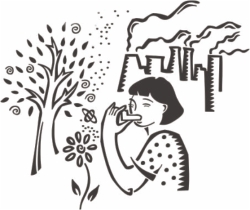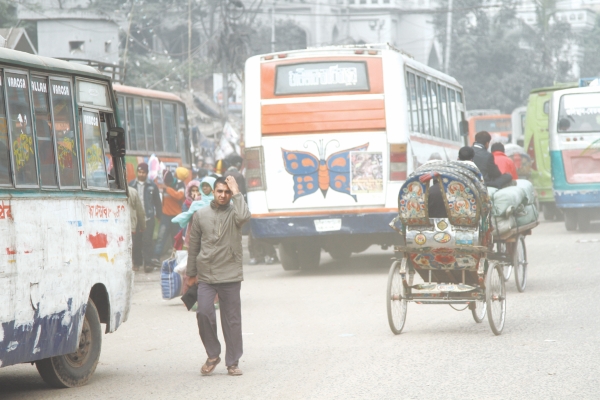| Home - Back Issues - The Team - Contact Us |
 |
| Volume 11 |Issue 03| January 20, 2012 | |
|
|
Health Breathe Today Anika Hossain
Air pollution is still an acute problem in Dhaka, mainly because this city is the hub of all commercial activity. We have transportation engines, power and heat generators, industrial processes and of course we burn solid waste. This may or may not come as a surprise to our readers, but air pollution usually tends to lead to majority of the health problems we so often complain to our doctors about. “Air pollution as such will not affect health directly,” says Dr Tariqul Islam, a general practitioner who has encountered many a sad soul affected by pollution, “However, if one is genetically pre-disposed to certain allergies or medical conditions, these might be aggravated by breathing polluted air.” According to Islam, conditions such as asthma, which is a common chronic inflammatory disease of the airways that prevents normal breathing and is characterised by symptoms such as wheezing, coughing, chest tightness and shortness of breath, is aggravated by breathing polluted air. Bronchitis is an inflammation of the mucous membranes of the respiratory tract that carries air into our lungs, which leads to either acute symptoms that lasts while a person is suffering from a viral fever or cold or chronic symptoms which can last upto two years. This condition is also significantly aggravated by breathing contaminated air. Now we all know that smoking causes lung cancer and other forms of cancer and eventually death, but did you know that second hand smoking is also capable of killing you? “Second hand smoking is just as harmful,” says Islam, “Repeated exposure can lead to one's air sacs becoming flabby and distended and these will eventually fail to pass oxygen to our lungs and other vital organs.” There are two types of second hand smoke that we are exposed to almost daily. Sidestream smoke, that comes from the end of a lit cigarette, pipe or cigar and mainstream smoke, which is exhaled by a smoker. These are commonly thought to be the same, but in reality, they are quite different. Sidestream smoke has higher concentrations of agents that cause cancer (carcinogens), than mainstream smoke. This also contains particles that are smaller than the mainstream smoke, which makes it easier for them to enter the body's cells. Non-smokers who breathe in nicotine and other toxic chemicals are just as badly affected as smokers.
There is evidence to suggest that second hand smoking can lead to lung cancer. Some evidence also suggests that it may be linked with childhood leukemia and larynx (voice box), pharynx (throat), brain, bladder, rectum, stomach and breast cancer. Second hand smoking can also lead to spontaneous abortion, still- birth, low birth-weight baby and other pregnancy problems. It can also reduce fertility. Babies and children exposed to this are at an increased risk of sudden infant death syndrome, acute respiratory infections, ear infections, asthma attacks, wheezing, coughing, pneumonia and slow lung growth. Over time, it may cause heart disease, strokes and heart attacks. Aside from smoking like chimneys, we have also been emitting harmful smoke through two-stroke engines used in baby taxis, tempos, mini trucks and motorcycles. Old trucks and mini buses are also major polluters. Diesel vehicles emit black smoke, which contains unburned fine carbon particles and no, covering your nose will not protect you from any of this. Although initiatives have been taken by the government to introduce CNG in our gas pumps to reduce pollution caused by these vehicles, it will be years before we are completely free from this. “These gases and volatile organic compounds (VOC) can increase the toxic levels in our blood vessels, causing changes in cellular levels and damage to blood vessels. This can lead to various diseases including heart problems,” says Islam. The Bangladesh Atomic Energy Commission (BAEC) and the Bangladesh Council of Scientific Industrial Research (BSCIR) has recently discovered the high concentration of lead in the air. Reports from the Dhaka Shishu Hospital shows that there is a high level of lead in the blood of children residing in Dhaka, resulting in poisoning, which produces neuro-developmental disorders in children. Research shows that about 50 tonnes of lead is emitted in the city's air annually and lead concentration in children's blood is about 7 to 16 times higher than the acceptable limit. The development of lead pollution can affect one's central nervous system, cause hypertension and renal damage. Children can suffer damage to their kidneys and brains. The workplace is also a major point of exposure for many residing in Bangladesh. Truck drivers, rail road workers, mine workers, jute mill workers and many more are exposed to particulate matter such as grit, dust and fibre that settles into the lungs due to regular exposure. An accumulation of these can also lead to respiratory problems and even lung infection in the long run. These are just a few of the many problems caused by air pollution. VOCs in the air can interfere with photosynthesis if they reach a certain level, cutting off our oxygen supply, and then where would we be? The government has taken various initiatives and introduced policies to reduce contamination of our air supply. We can do our part by using CNG, being more aware of our surroundings, spreading awareness about smoking and gas emissions, recycling and routine medical checkups just to make sure we won't die tomorrow. Copyright
(R) thedailystar.net 2012 |
||||
 D
D